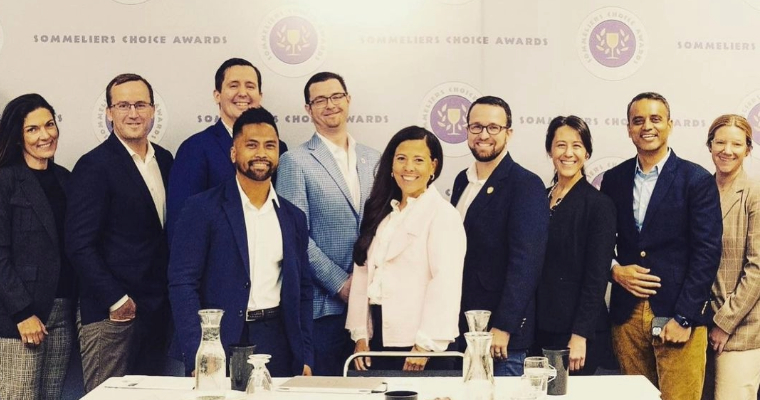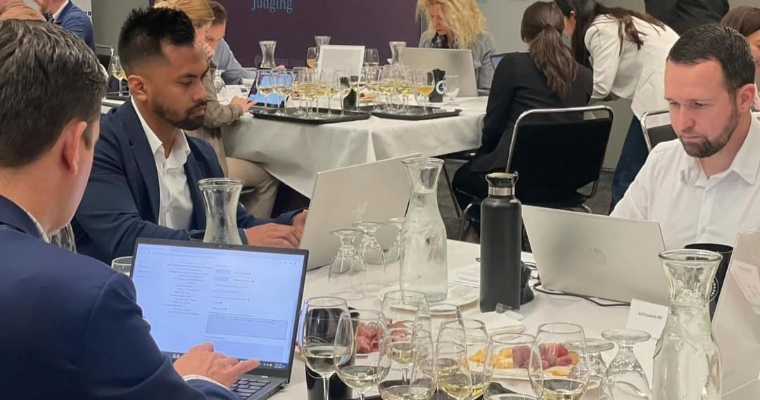Super Early Bird Deadline
October 31, 2025
Judging
Date
May 18, 2026
Winners
Announced
June 10, 2026

As the Beverage Director at Sabio Hospitality Group in the San Francisco Bay Area, Ranier Reglos oversees the wine programs, curates wine pairings, manages vendor relationships, and leads cocktail creation for the group’s in-house restaurants. With nearly 15 years of experience in the industry, Reglos shares his insights with the Sommeliers Choice Awards on the importance of tailored staff training, creating trend-driven wine menus, and the other strategies that contribute to a profitable and dynamic beverage program.
While interning at a bartending school, I met a sommelier and was fascinated by what they did—it seemed like such a cool career. They encouraged me to pursue a sommelier course, and I decided to give it a shot. At that point, I’d only had two glasses of wine in my life, but that experience sparked a passion, and the rest is history.
I love the interaction and the satisfaction that comes from seeing my recommendations succeed—whether it’s a guest smiling after their first sip of wine or enjoying a bite with a perfect pairing. Another aspect I really enjoy is watching the growth of the staff I’m training. The more we pass on our knowledge, the better it is for the industry. I believe the wine industry has stagnated in some ways, and by sharing our passion for wine with others, we can inspire more innovation and new ways for people to enjoy wine.
The first step is to ask a qualifying question to get a sense of the guest's preferences. I might ask about what they enjoy drinking in general—do they like sweet cocktails, coffee drinks, or even boba? I’d also inquire about their favorite foods. These personal questions help create a connection and provide insights, allowing me to guide them toward a wine they’re likely to enjoy.

Image Title: Rainier Reglos at the Sommeliers Choice Awards (source)
One of the most important skills for a sommelier is the art of storytelling. Every wine, whether it costs $12 or $5,000, has a unique story to tell. These stories add romance and intrigue, making the experience more engaging. Storytelling engages guests and staff, making them more likely to enjoy the wine.
I look for someone who is knowledgeable about wine and other beverages, and they should also be personable. A sommelier is constantly interacting with staff, guests, vendors, and management, building relationships that are crucial to the success of the beverage program. The ability to navigate these relationships can make or break the program, and clear communication about expectations is essential, though often more challenging than it seems. Time management is the second critical quality I look for while hiring. A sommelier needs to balance tastings, ordering, teaching, inventory, service, and vendor relationships efficiently. Without strong organizational skills, the demands of the role can quickly become overwhelming.
[[relatedPurchasesItems-61]]
I start by assessing their previous wine experience. I’d ask if they’ve had any formal wine training, whether they’ve worked with wine service before, and if they’re familiar with opening bottles, selling wine, or even drinking it themselves. Wine can be intimidating for those with little experience, so I like to create a tailored training program based on their knowledge and comfort level. The key is to get them excited about the wine program and ensure they understand its direction and vision for the restaurant or bar.
To grow beverage sales, it’s essential to understand your customers. Early in their careers, many sommeliers focus on curating wine lists based on what they think will sell, rather than aligning with current market trends and customer preferences. While taking risks is important, it’s crucial to engage with guests and understand what they’re looking for. For example, at the beginning of the year, many of my customers asked for non-alcoholic wines, and I noticed a decline in alcohol consumption during 'Dry January.' After researching and adding non-alcoholic wines to our list—both by the bottle and by the glass—I saw an immediate boost in sales. The next step is developing a low-ABV and non-alcoholic pairing menu to complement our dinners, which I believe has significant potential.
Also read: How Warner Boin is Transforming Consumer Perceptions of Wine
A solid wine program doesn’t need to have 1,000 wines—it’s more about having a clear direction or theme. This could be reflected in pricing, varietals, country of origin, or even unconventional tasting notes. Wine programs with fewer than fifty bottles can be particularly intriguing because they truly showcase the personality and philosophy of the sommelier or bar manager. When done well, these curated programs offer valuable insight into their approach to wine, and if successful, they serve as a huge inspiration to me.
Also read: Marsha Wright's Guide to Curating the Perfect Wine List

Image Title: Rainier Reglos judging wines at SCA (source)
The first thing I do is compare the current sales data with the previous year's data to see if the sales figures have increased as per the goal I set. I typically aim to increase the sales by 15%. If we have not achieved the target, I try to come up with ways to achieve it before the year ends. Additionally, if a previously successful wine category is showing a decline in sales, I evaluate how we can elevate it. While assessing the effectiveness of a wine list can be complex, the simplest way to gauge its success is by looking at the bottom line and whether it aligns with the goals set for the program.
I learn by visiting other restaurants and analyzing their beverage lists. I observe what guests are ordering at different tables and look for inspiration. When possible, I try to connect with the sommelier or bar manager to discuss their approach and learn about their strategies for success. Learning from peers, whether they are Master Sommeliers or newcomers to the wine world, is invaluable, as it gives me a broader perspective. Currently, I read various wine publications, but as I’m also responsible for cocktail creation, I’ve been diving into books like Liquid Intelligence by Dave Arnold and The Bartender's Pantry to further expand my knowledge.
Header image by Ranier Reglos
Related Links
Jeff Van Ham’s Approach To Elevating The Guest Experience And Boosting Sales At Minos
Alexia Fagundes Klein On Navigating A World-Class Wine Experience On A Luxury Cruise
Enter your Wines now and get in front of top Sommeliers, Wine Directors, and On-Premise Wine Buyers of USA.
